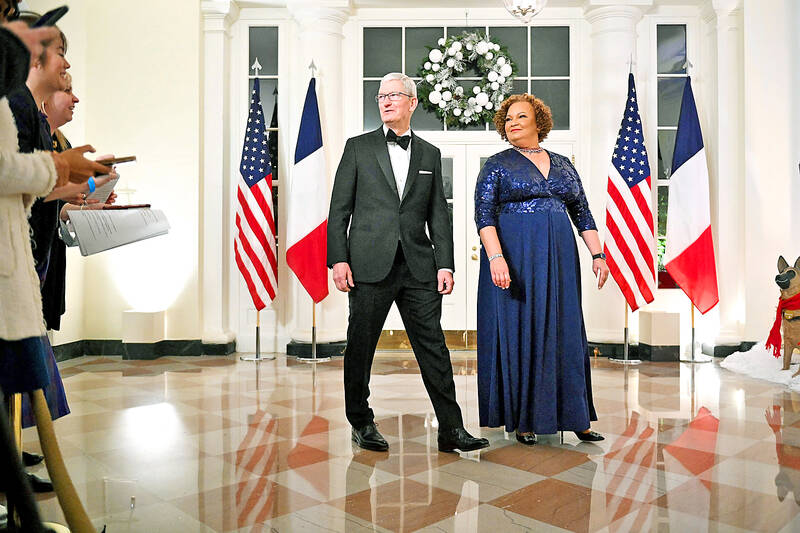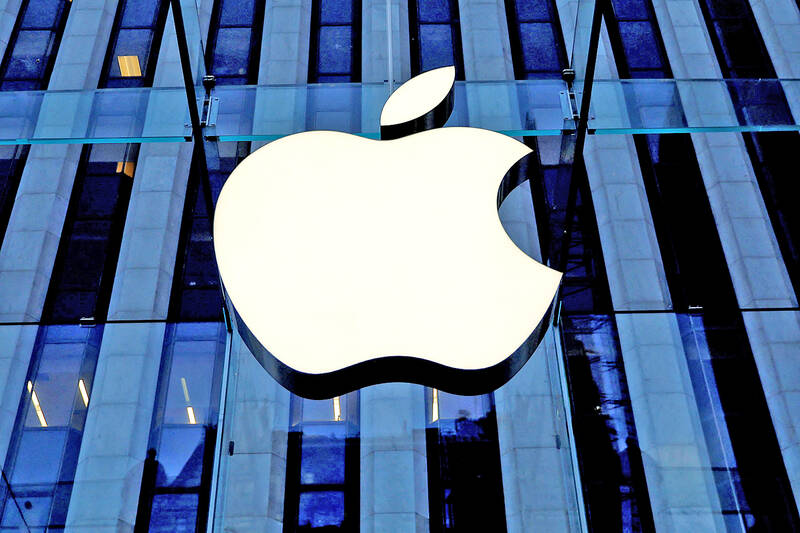Apple Inc is cutting CEO Tim Cook’s compensation by more than 40 percent to US$49 million this year, citing investor guidance and a request from Cook himself to adjust his pay.
As part of the changes, the percentage of stock units awarded to Cook and tied to Apple’s performance would increase to 75 percent this year from 50 percent, as well as in future years, the company said in a regulatory filing on Thursday.
Last year, Cook received compensation of US$99.4 million, including US$3 million in base salary, about US$83 million in stock awards and a bonus. That was up slightly from 2021, when his total pay package was US$98.7 million.

Photo: AFP
Cook’s latest pay was based on “balanced shareholder feedback, Apple’s exceptional performance and a recommendation from Mr. Cook,” the iPhone maker said in the filing.
The company also plans to “position Mr. Cook’s annual target compensation between the 80th and 90th percentiles relative to our primary peer group for future years,” Apple said.
Apple has drawn criticism from groups such as Institutional Shareholder Services (ISS) about Cook’s previous compensation package, but a majority of shareholders voted to approve it last year.

Photo: REUTERS
ISS, a top advisory firm, said that Cook’s stock would continue to vest post-retirement and that half of the rewards did not depend on performance criteria such as the company’s share price.
The US$49 million in target compensation includes the same US$3 million salary and US$6 million bonus as last year, as well as an equity award value of US$40 million.
His equity award value last year was US$75 million.
Cook’s actual total compensation for this year could fluctuate based on the company’s stock performance.
Cook, 62, has pledged to give away his wealth to charitable causes.
It is rare for CEOs to recommend their own compensation be docked. Pay packages have gotten increasingly lavish, and 2021 was a record year for executive compensation, Bloomberg data showed.
However, shareholders have increasingly pushed back on such packages.
A record number of so-called say-on-pay votes failed in 2021, which might have reflected shareholders’ frustrations with how companies performed during the COVID-19 pandemic, financial services company Mercer said.
Apple also disclosed last year’s compensation for chief financial officer Luca Maestri, general counsel Kate Adams, retail head Deirdre O’Brien and chief operating officer Jeff Williams. Those executives were all paid about US$27 million — including salary, stock and a bonus — last year, slight increases from the previous year.
The Cupertino, California-based technology giant also announced that its annual shareholder meeting would take place virtually on March 10.
Apple shares declined 27 percent last year, although that was less of a drop than the one posted by the tech-heavy NASDAQ Composite Index.
Apple shares have climbed 2.7 percent so far this year.

‘SWASTICAR’: Tesla CEO Elon Musk’s close association with Donald Trump has prompted opponents to brand him a ‘Nazi’ and resulted in a dramatic drop in sales Demonstrators descended on Tesla Inc dealerships across the US, and in Europe and Canada on Saturday to protest company chief Elon Musk, who has amassed extraordinary power as a top adviser to US President Donald Trump. Waving signs with messages such as “Musk is stealing our money” and “Reclaim our country,” the protests largely took place peacefully following fiery episodes of vandalism on Tesla vehicles, dealerships and other facilities in recent weeks that US officials have denounced as terrorism. Hundreds rallied on Saturday outside the Tesla dealership in Manhattan. Some blasted Musk, the world’s richest man, while others demanded the shuttering of his

ADVERSARIES: The new list includes 11 entities in China and one in Taiwan, which is a local branch of Chinese cloud computing firm Inspur Group The US added dozens of entities to a trade blacklist on Tuesday, the US Department of Commerce said, in part to disrupt Beijing’s artificial intelligence (AI) and advanced computing capabilities. The action affects 80 entities from countries including China, the United Arab Emirates and Iran, with the commerce department citing their “activities contrary to US national security and foreign policy.” Those added to the “entity list” are restricted from obtaining US items and technologies without government authorization. “We will not allow adversaries to exploit American technology to bolster their own militaries and threaten American lives,” US Secretary of Commerce Howard Lutnick said. The entities

Minister of Finance Chuang Tsui-yun (莊翠雲) yesterday told lawmakers that she “would not speculate,” but a “response plan” has been prepared in case Taiwan is targeted by US President Donald Trump’s reciprocal tariffs, which are to be announced on Wednesday next week. The Trump administration, including US Secretary of the Treasury Scott Bessent, has said that much of the proposed reciprocal tariffs would focus on the 15 countries that have the highest trade surpluses with the US. Bessent has referred to those countries as the “dirty 15,” but has not named them. Last year, Taiwan’s US$73.9 billion trade surplus with the US

Prices of gasoline and diesel products at domestic gas stations are to fall NT$0.2 and NT$0.1 per liter respectively this week, even though international crude oil prices rose last week, CPC Corp, Taiwan (台灣中油) and Formosa Petrochemical Corp (台塑石化) said yesterday. International crude oil prices continued rising last week, as the US Energy Information Administration reported a larger-than-expected drop in US commercial crude oil inventories, CPC said in a statement. Based on the company’s floating oil price formula, the cost of crude oil rose 2.38 percent last week from a week earlier, it said. News that US President Donald Trump plans a “secondary